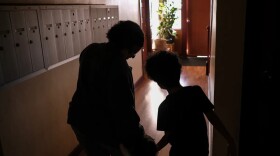Every weekday morning, 86-year-old Bob Duff sits at the same table inside the La Mesa Senior Center. He is social, quick to laugh, and always up for a conversation.
A couple of months ago, someone new reached out. Not at the center, but on his phone.
“‘Are you busy tomorrow?’ And I thought, ‘okay, who's this?’ So I said, ‘busy for what?’ And it came back, ‘you coming to the barbecue?’ I thought, ‘who is this?’”
What started as a confusing text turned into a friendly pen-pal exchange with someone claiming to be a 37-year-old South Korean woman named Calista. She shared a photo and asked Duff to chat on Telegram, a messaging app that can be used to transfer money.
“She said this is a friendly conversation. I'm going to be kind of a pen pal. I thought, I have no problem with that. I think it's kind of fun,” Duff said.
Duff, who retired years ago, splits his time between the senior center and caring for his wife, Judi. He said he’s not lonely, but admits the idea of making a new friend felt nice.
“And we just kind of talk back and forth about many stuff. I don't even remember. It was so innocent to me. But as I reflect back on it, maybe it wasn't so innocent, she was baiting,” he said.
The conversation felt genuine, until his daughter read the messages.
“She didn’t say it sounds like a scam. She said, that's a scam! What are you doing? And I thought, well, you make me think I'm an idiot or something. And so I put my defenses up,” Duff said.
Attempts like these are common, sneaking into inboxes and phones under the guise of romance, friendship or urgent financial alerts.
Duff was lucky. His daughter helped catch the scam before he lost any money. But many older adults aren’t as fortunate. In 2024, San Diego seniors victimized by scammers lost an average of more than $30,000.
“We are getting over 1,000 cases a year reported to us and the reality is that we are only able to work less than 1% of those cases,” said San Diego County Deputy District Attorney Scott Pirrello.
He said many scams originate overseas, in Southeast Asia, the Caribbean or Africa, making it difficult to prosecute.
“So it does drive us to really push for prevention and education, because in some cases it really is, the best defense is to educate the community so that they don't become victims in the first place,” said Pirello, who leads elder abuse prosecutions.
But many victims never report the crime.
“These victims oftentimes don't report or self-disclose because of embarrassment,” said Jennifer Sovay, who oversees San Diego County’s Elder Justice Task Force.
The task force connects scam cases and traces larger criminal networks.
“Many older adults are not savvy to technology and how it works. So that's oftentimes how they've fallen victim to these crimes,” Sovay said.
Even if caught early, the emotional toll of a scam can linger according to UC San Diego Geriatrician Dr. Ian Neel.
“There's a higher incidence of depression, of anxiety, or even just technology avoidance,” Neel said. “Which leads to further loneliness. So there can be kind of a cascading snowball effect,”
Trust tends to increase with age, Neel said, and scammers exploit that.
“The older we get the more friends and loved ones we lose. And so there is a high incidence of loneliness and isolation and that can make us more prone to looking for friendship wherever we can,” he said.
Duff is more cautious now.
“Does that mean you don't talk to anybody? No, I don't believe in that,” he said. “Does that mean you should say everything is cheating you? No, I don't believe that either. Cause I still believe in honest people.”
He now monitors his messages closely. At the senior center, he pulled up a new message.
“It’s my latest scam,” he said. “If I click on it, maybe I'm downloading something which I don't want to do.”





